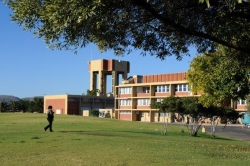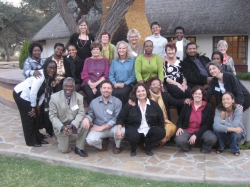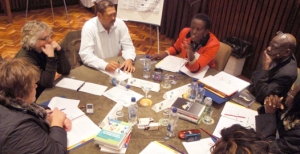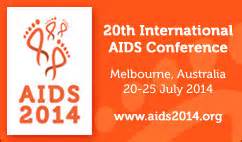
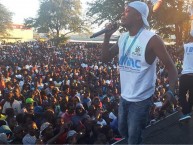
Namibian newspaper New Era reported today that hip hop artist The Dogg (real name Martin Morocky) has agreed to be circumcised next month by Dr. Bernard Haufiku, Namibia’s Minister of Health and Social Services, as part of the country’s voluntary medical male circumcision (VMMC) program. The procedure is to take place on Minister Haufiku’s birthday, Sept. 19.
The International Training and Education Center for Health (I-TECH), with PEPFAR funding, has supported the VMMC efforts of the Ministry of Health and Social Services (MOHSS) in the Oshana and Zambezi regions on many fronts. Between 2010 and 2014, I-TECH supported health care worker training in the provision of VMMC nationwide and has supported the delivery of VMMC procedures since November 2014. Since the start of this year, I-TECH has also been engaged in critical efforts to create demand for the procedure.
Marocky, who lost both of his parents to HIV/AIDS, was previously involved in the MOHSS’s “Break the Chain” campaign to reduce concurrent sexual partnerships in Namibia. He’s been a VMMC ambassador since May 2016, serving as the face behind a nationwide concert and social media campaign urging 15- to 49-year-old men to “get the smart cut.”
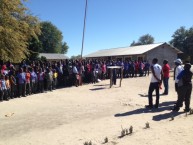
So far, Marocky has held nine concerts in the Erongo, Oshana, and Zambezi regions, as well as delivered encouragement to young men through radio talk shows and TV advertisements. He has also spoken one-on-one to young men about the preventive benefits of VMMC — namely, that the procedure can reduce the risk of HIV infection by more than 60%.
“I’ve encouraged ‘the smart cut’ through my music and appearances,” said Marocky. “But I’m now looking forward to protecting myself and setting a personal example for young Namibian men.”
The musician will join the more than 11,200 men in Oshana who have undergone a VMMC since 2009. More than 80% of the 12,250-plus procedures performed with I-TECH support since January 2015 are in the high-priority 15- to 29-year-old age group.
Currently, only about a quarter of Namibian men are circumcised. Overcoming cultural hurdles and mobilizing men to get the procedure has become a high priority for the MOHSS.
“Training clinicians in the procedure is only half the battle,” said I-TECH Namibia Country Director Norbert Forster. “Getting the word out to young men about the benefits of VMMC is crucial to ensuring the success of this intervention. The Dogg’s campaign has gone a long way toward changing minds and attitudes.”
The MOHSS and I-TECH are jointly engaging in a number of additional demand generation activities, which mainly focus on school-aged boys and young working men. One such activity, a bicycle lottery, is highlighted below.
Community Members Win Bicycle Lottery After Volunteering for VMMC
The MOHSS, with the support of I-TECH, has awarded the first two winners of new bicycles in a lottery held at Katima Mulilo State Hospital in the Zambezi Region.
The lottery was implemented to encourage more men to come in for VMMC; Zambezi remains the region most affected by HIV/AIDS in Namibia.
The first winner is an NDF soldier. His winning ticket was drawn out of the first group of men who were circumcised between March 1 and April 30, 2016, in the Zambezi region. The second winner, drawn from the May to July cohort, was a 16-year-old attending Mavuluma Senior Secondary School, a remote school in eastern Zambezi region.
During June of this year, the MOHSS Zambezi region team managed to mobilize and circumcise a total of 773 men as part of its I-TECH-supported VMMC program. The vast majority of recipients were between 15 and 29 years of age.
